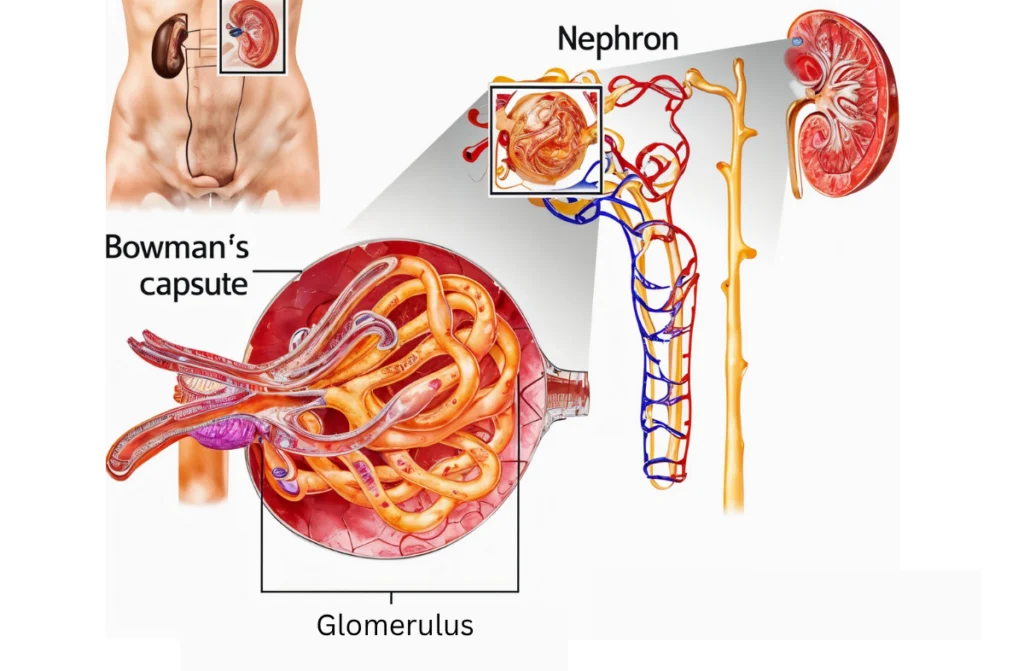Nephrotic kidney syndrome is a serious medical condition that causes the kidneys to release excessive protein into the urine, leading to fluid retention and swelling in areas like the face, abdomen, and legs. This syndrome can affect individuals of all ages, significantly impacting their daily life and overall well-being. Early diagnosis and prompt treatment are essential in minimizing the effects of this condition. Understanding the symptoms, root causes, and available treatment options can greatly improve the lives of those affected by nephrotic syndrome, allowing them to manage the condition more effectively.

What is Nephrotic Syndrome?
Nephrotic syndrome occurs when the glomeruli in the kidneys, which are responsible for filtering waste and fluids from the blood, become damaged. This damage allows proteins that should remain in the bloodstream to leak out into the urine, disrupting the body’s fluid balance. This imbalance can result in several key symptoms:
- Loss of Protein: Protein that is typically kept in the blood leaks into the urine.
- Swelling (Edema): Excess fluid accumulates in various parts of the body, particularly the legs, face, and abdomen.
- Foamy Urine: High levels of protein in the urine cause it to appear bubbly or frothy.
Identifying and treating nephrotic syndrome early is critical to controlling these symptoms and preventing further complications.
Symptoms of Nephrotic Syndrome
The significant loss of protein through urine disrupts the body’s normal fluid levels, leading to a range of observable symptoms:
- Edema (Swelling): Fluid retention often manifests as swelling in the face, around the eyes, or in the lower limbs, including feet and legs.
- Foamy Urine: When excess protein is present in the urine, it may appear foamy, which is a classic sign of nephrotic syndrome.
- Rapid Weight Gain: Fluid retention can lead to sudden weight gain that is not related to increased body fat.
- Fatigue: With the depletion of energy-producing proteins, individuals may experience chronic tiredness and lack of energy.
Being vigilant about these symptoms and seeking timely medical attention can help ensure the condition is managed more effectively.
Causes of Nephrotic Syndrome
Nephrotic syndrome can result from a variety of causes that damage the kidneys’ filtering mechanisms, leading to protein leakage. These causes can be classified as:
- Primary Kidney Disorders: Diseases such as minimal change disease, focal segmental glomerulosclerosis (FSGS), and membranous nephropathy directly damage the kidneys, often resulting in nephrotic syndrome.
- Secondary Causes: Conditions like diabetes, lupus, and other chronic diseases can lead to kidney damage over time, contributing to nephrotic syndrome.
- Infections and Medications: Certain infections or medications can also cause nephrotic syndrome by damaging the kidneys’ ability to filter proteins.
Understanding the underlying cause is vital for tailoring treatment strategies that address both the syndrome and its root cause.
How Common Is Nephrotic Syndrome?
Although nephrotic syndrome is not as common as other kidney diseases, it still affects people of all ages worldwide. Recognizing how often the condition occurs can promote early diagnosis and intervention:
- In Children: Nephrotic syndrome is more common in children, especially due to minimal change disease, which is the leading cause in pediatric cases.
- In Adults: In adults, nephrotic syndrome is often the result of long-term chronic conditions such as diabetes or lupus, making the treatment more complicated and requiring specialized care.
Although not widely prevalent, the importance of recognizing the early signs of nephrotic syndrome cannot be overstated, as early intervention is key to better health outcomes.
Diagnosis and Tests
Diagnosing nephrotic syndrome involves several steps to confirm protein loss and assess kidney function:
- Urine Test: A urine analysis measures the amount of protein in the urine and is one of the first indicators of nephrotic syndrome.
- Blood Tests: These tests evaluate kidney function and measure albumin levels, which help determine the severity of protein loss.
- Imaging Tests: Ultrasounds or CT scans may be performed to assess the structure and function of the kidneys.
- Kidney Biopsy: In certain cases, a biopsy may be necessary to analyze kidney tissue and pinpoint the exact cause of nephrotic syndrome.
These tests play an essential role in understanding the extent of nephrotic syndrome and crafting an effective treatment plan.
Treatment for Nephrotic Kidney Syndrome
The treatment for nephrotic syndrome focuses on managing symptoms, preventing further kidney damage, and addressing underlying causes. A comprehensive approach typically includes:
- Medications: To reduce inflammation and control protein leakage, steroids and immunosuppressive medications are often prescribed.
- Blood Pressure Control: Medications like ACE inhibitors or ARBs help manage high blood pressure and protect kidney function.
- Dietary Changes: A diet low in salt and with appropriate protein intake can help manage fluid retention and maintain overall health.
A personalized treatment plan can help individuals with nephrotic syndrome manage the condition effectively and improve their quality of life.
Nephrotic Syndrome Side Effects
Nephrotic syndrome has far-reaching effects beyond the kidneys, influencing other parts of the body as well. Managing these side effects is critical to preserving overall health:
- High Blood Pressure: Fluid buildup can elevate blood pressure, requiring careful monitoring and treatment.
- Elevated Cholesterol: Protein loss can lead to increased cholesterol levels, which may increase the risk of heart disease.
- Increased Risk of Infection: Depleted proteins weaken the immune system, making the body more susceptible to infections.
- Blood Clots: Alterations in blood proteins may increase the risk of clot formation, which necessitates careful monitoring and preventive care.
Addressing these side effects with a holistic approach can significantly improve the health and well-being of nephrotic syndrome patients.
Conclusion
While nephrotic syndrome can be challenging to live with, understanding its symptoms, causes, and available treatments is key to managing the condition. Early diagnosis, personalized care, and ongoing treatment are critical to controlling symptoms and preventing complications. At CTS Hospitals, we are dedicated to providing comprehensive care and support to individuals affected by nephrotic syndrome, helping them maintain a healthy and fulfilling life.
